The ART OF STORYTELLING: Pretentious, self-obsessed and utterly boring. Mike Sowden, of Fevered Mutterings (Misadventures in Travel & Storytelling), lets us in on his first take on the art of storytelling during our second day of this year’s Travel Bloggers Unite Conference in Rotterdam: Clearly, it is a far cry from the inspiration he achieves through his writing nowadays. As a travel writer / travel blogger, you are always on the lookout for a good story. But where does a good story come from, and how can you tweak your very own mutterings to the point of constructing one yourself?
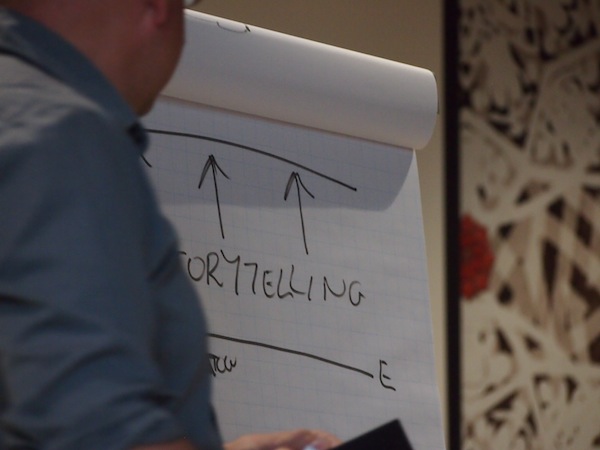
Mike Sowden about the “Art of Storytelling”: He is compelling even in his one-hour talk that morning. We really enjoy listening to him!
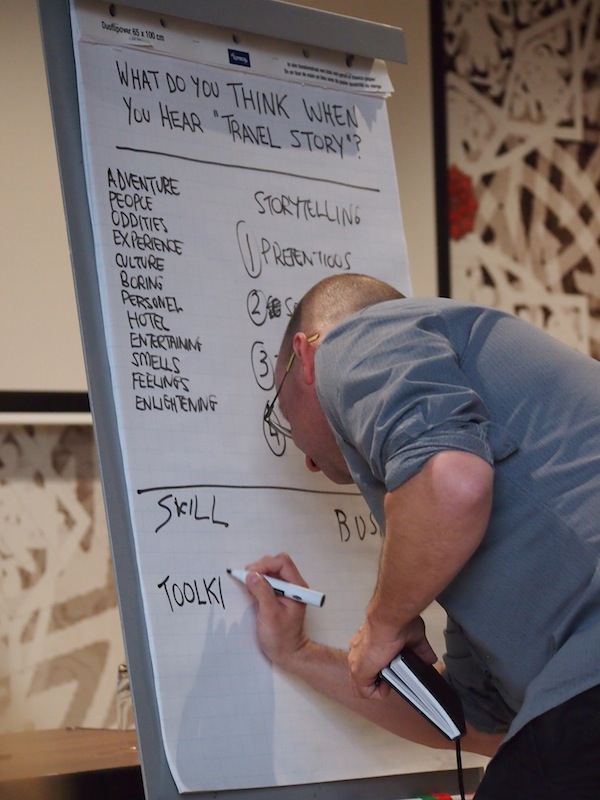
To move from being pretentious and boring, Mike identifies the following for a “good art of storytelling”: Skill, business & toolkit. The message: Everybody, including you, can write a good story.
On the Art of Storytelling: “The world is exciting, but it is not going to kill you.”
In his one-hour speech, Mike mentions that one of the crucial aspects in storytelling is to “get useful things out of stories that are applicable to your own life” (as a reader of that story). “Do not be afraid to show the bad things – don’t wallow too much in them either – however try and achieve a form of compelling writing: Readers can tell when you are glossing over something. Dare to upset people a little and end on that feeling that the world is exciting but it is not going to kill them.” An interesting point.
Furthermore, what is important is to convey all those fine-grained details in your writing: Actual brain research has shown that readers get “tucked in” the same way as if they experienced a situation for real. By providing sensual details & imagery, you are able to get readers hooked: As if they could smell that rose for real. As if they could really touch the surface of that bed or become tense in front of an unknown situation. Always provide a so-called “story arch” in your writing: Achieve something to work towards, both as a writer as well as for your readers. Rework the story so you start in the middle, i.e. at the point of maximum tension. Finally, do consider the power of reaching the buying public: Consider the mass of people, e.g. through the likes of Kickstarter.com alongside single sponsors or influencers to your writing, in achieving your very own writing goals.
Blogging Skills: Sarah Lee, of Liberating Luxury For The Smart Traveller, talks to us about “why we are worth it”.
I like talking business. Perhaps because I have had so many good experiences being a young, self-employed business woman for the past two years myself. Power to the people: Bloggers in this case. “Do not give away your content for free.” Sarah hammers home her message with a very clear point: If you do, you are creating, and indeed perpetuating, an understanding among travel industry and travel bloggers that travel writing on travel blogs should be for free. However, all of us can, and should, provide a lot more than that. Essentially, bloggers have and should market skills in the following domains:
- Writing
- Video
- Editing
- Web design
- Consulting
- PR & Marketing
- Podcasting
- SEO
- Photography
- Curation
- Translation
- Brand ambassador (testimonial)
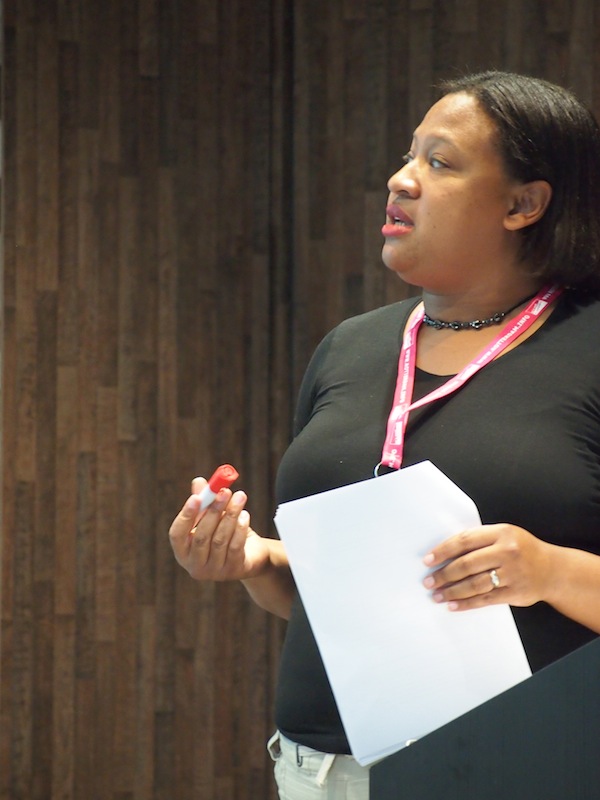
Sarah Lee runs her own company at Maia Communications and has built the online magazine “LiveShareTravel” together with her husband Terry Lee: Check it out at www.livesharetravel.com
Bloggers display a huge skill set.
“As people, we are not one dimensional, nor should your business be.” On a sweet side note, Sarah explains to us that her husband Terry is actually a masseur ;), so besides running LiveShareTravel.com, he is “using every skill he has got.” (Terry adds: “When I started, everybody told me I was very good.” Oh Terry! We love you, and certainly you are very good at what you are doing 😀 ).
Sarah then goes on to say that potential revenue sources for creating a writing business could be inflight magazines, national newspapers, authoring books, special projects (TV shows, etc.), freelance travel or business writing, and speaking assignments. So how is it that you are able to pitch? Travel editors, Sarah explains, look for unique stories, stories that offer an unusual take on a destination and come with a rich narrative. A thread has to run through the story, provide detailed descriptions, and add something new. Finally, you need to ask yourself as to why somebody should commission the story from you as “any blogger out there”? Clearly, you should market your personal background, skills and experience. In your pitch, explain who you are and you you’ve written for, give a short outline of the story you would like to write and explain why you should write it; why it is of interest. Think multimedia in your presentation!
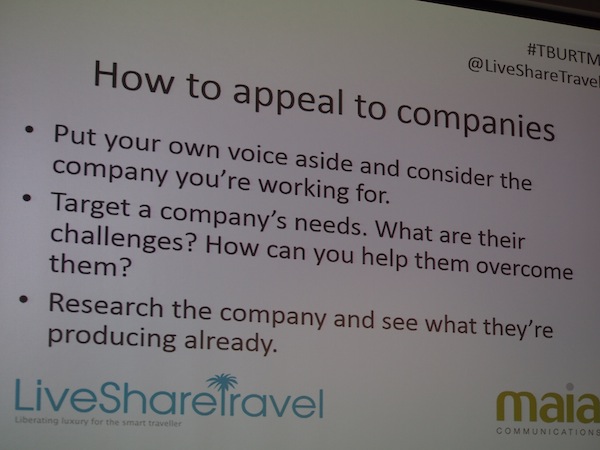
“How to appeal to companies” in the travel writing industry: Sarah Lee talking business. I like: Very inspirational and clear-cut words to start travel blogging communication as a business.
Books have become the new business card.
“With over 500 posts, how was a newbie to my blog to find the information they needed? I put it together in the Solo Traveler’s Handbook!” (quoting Janice Waugh of SoloTravelerBlog.com).
As an author, Sarah mentions, you become “an expert in your field“: It offers new opportunities to market your site. When wishing to appeal to companies, you have to do your homework: What is their main company ethos? What have they already produced? What are their needs? Then, research the right contacts, get in touch, be professional. Also try and get testimonials from people, e.g. quotes in your media kit, quote for pitching to somebody new, etc.
Charge For Your Work!
How would you charge for your work?! Based on her experience, Sarah details that this really does depend on how much work you are doing for any type of commission. Print commissions usually have standard, non-negotiable rate, but sometimes it pays to re-negotiate. Her tips are to research the market, see what others are charging and work out a daily rate where you feel comfortable: A good point to start from could be from e.g. € 400 and upwards.
To sum it all up, let’s think about:
- What skill set do you have? (This is about yourself.)
- Who are you pitching to? (This is about researching the market.)
- Identify a personal SWOT analysis: Strenghts, Weaknesses, Opportunities and Threats. (This is about you.)
- Consider who the competition is. (This is about “all the other fish in the sea”.)
- Look at how what you do, differs. From that, identify your USP: Your Unique Selling Proposition as marketers would say.
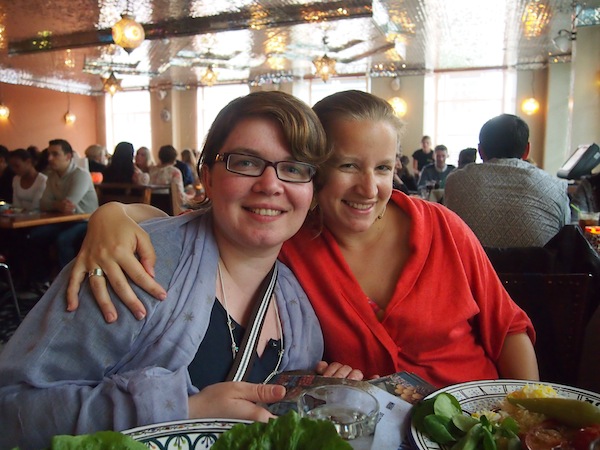
Whether your expertise be about writing of “travelling with locals” or “foodie travel in exotic restaurants”: Be clear about your message and what you want to achieve. Thank you, Janett Schindler (Teilzeitreisender.de) for this sweet message here!
Self-Publishing: Terry Lee of LiveShareTravel explains the process of launching “The Luxury Traveller’s Handbook”
According to Terry, one of the first questions anybody with a desire to publish a book has to ask themselves is this: “What is the purpose in spending the time and effort to write a book“? Is it to sell thousands or hundreds of copies (i.e. profile over income), is it to sell to bloggers or travellers (decide your audience), is it to drive newsletter sign-ups, etc. … ?
In the case of “The Luxury Traveller’s Handbook“, clearly “the main focus was to be seen as experts in the niche, as well as to drive side traffic to the site and boost newsletter sign-ups.” Altogether, it took him and his wife Sarah about two months of writing, while the process of proofing, editing, etc. took a lot longer. He also stresses that it is important to have friends and colleagues to be able to ask for valuable feedback. Books improve tremendously when subject to this kind of feedback – blunt, but coming from a good place with a good heart. “You get so close to your book – it becomes your precious baby! – that this kind of support is needed.” Furthermore, be prepared for serious discussions with your editors but do make sure that your way prevails “because ultimately, it is your name(s) on the book.”
Once you’ve got your book, it needs to be made available for purchase. The way it was for the series of The Traveller’s Handbooks was to choose an ebook (“Bookbaby”) and a printed version (“Lightening Source”). “The biggest beast in the jungle is Amazon: You need to be there.” Print-On-Demand is a lot cheaper, and more efficient, than traditional ways. Bookbaby caters to most apps / devices for e-reading.
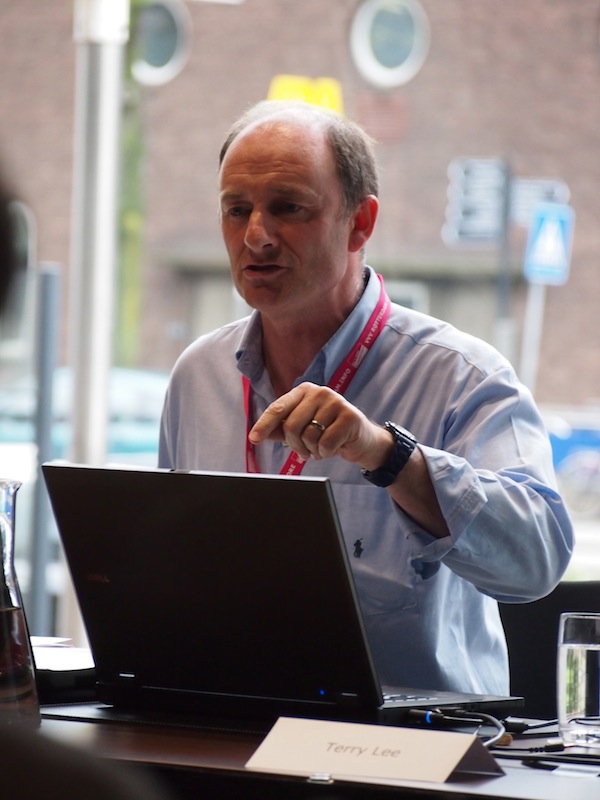
Terry Lee talking about Self-Publishing at this year’s Travel Bloggers Unite Conference in Rotterdam.
Marketing & Sales of Publishing A Book: “We made our mums very proud.”
As a self-publisher, you do not have the marketing assistance of a traditional publishing house. What you should use, therefore, are all online marketing tools at your disposal: Blog, Twitter, Facebook, Social Media, friends / contacts to write book reviews for you, guest posts, (video) interviews with e.g. the likes of hostel world, publish press releases, contact (local) radio stations, do book readings, get into libraries, write reviews on Amazon, etc.
“Unity Is Strength: In the case of The Luxury Traveller’s Handbook, we have been fortunate enough to count on a cross-pollination of support for our marketing purposes. We advertised and generated sales for each other thanks to an existing network. Finally, one of the most important benefits has been to boost our confidence as writers, to move from ‘blogger to writer’ and gain that aura of seriousness. It is really about establishing your brand, or name, in a niche.”
Well said Terry, Sarah, Mike & all the rest of you who I was fortunate enough to listen to today. Thank you so much for sharing your ideas!
Further images & photo impressions of this year’s Travel Bloggers Unite conference in Rotterdam can be found here: Enjoy!
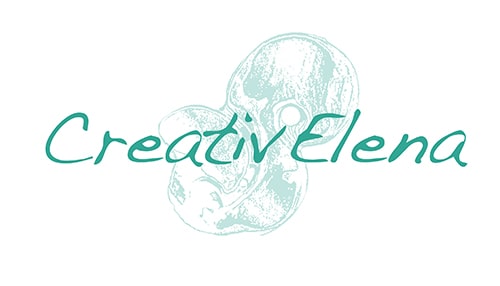


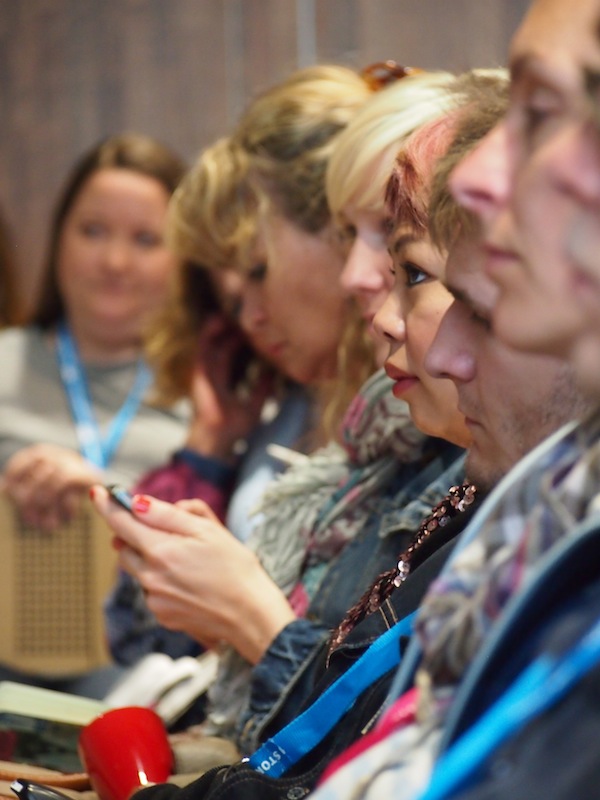
2 comments
Great post! Good pictures too. (By chance I am on one of them, in blur, since u focussed on the very fashionable Yishyene;-))
The first two sessions I attended as well. The one about self publishing I would have loved to attend, but chose for another one, also interesting. So via ur post I can read what it was about. Tx!
Had to leave the conference last nite. Hv a fruitful day today!
Kind regards, Anja
Thank you Anja for all your feedback !!
I really appreciate to be of help to you 🙂 Hope to catch you later at some stage, take good care xoxo